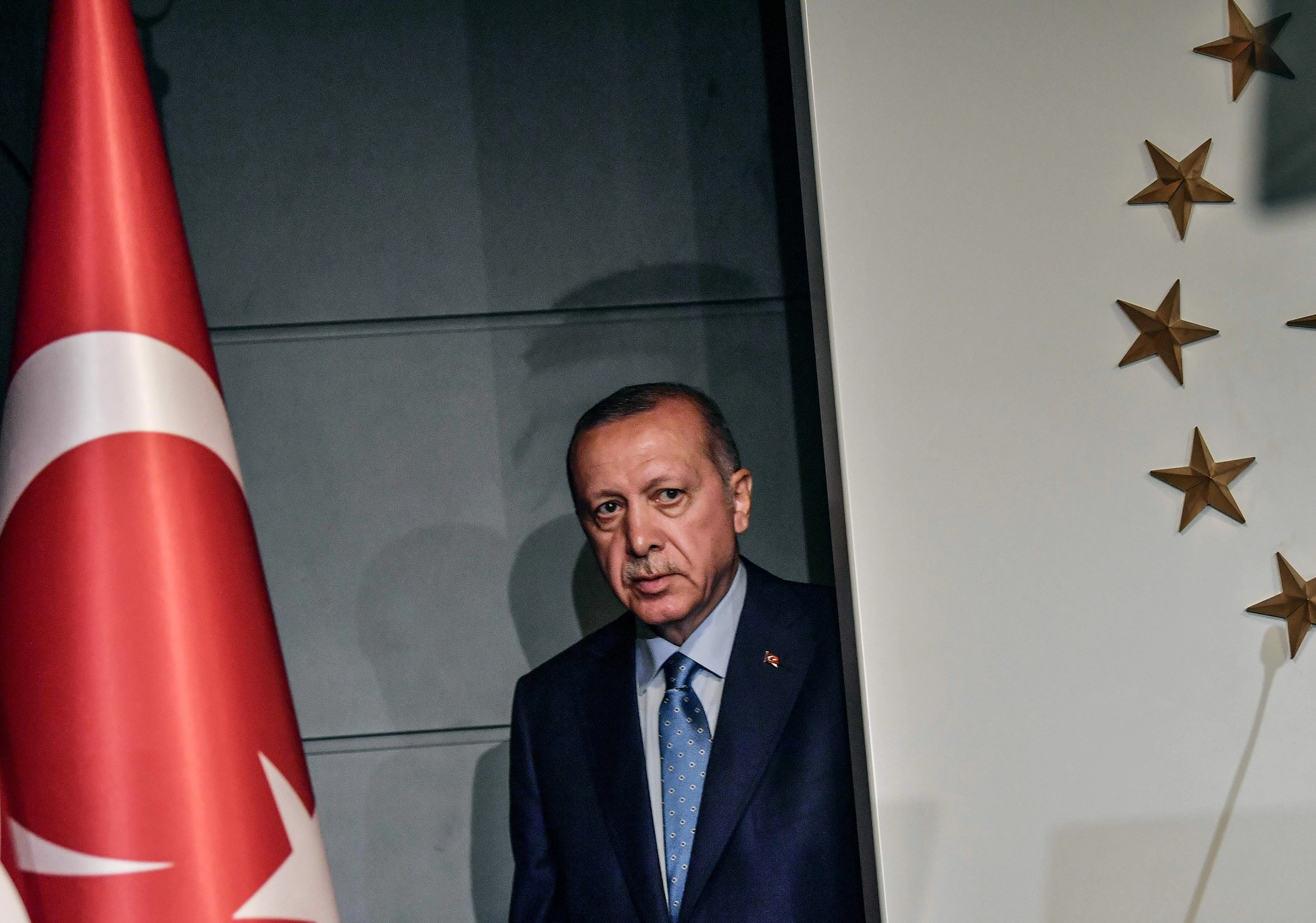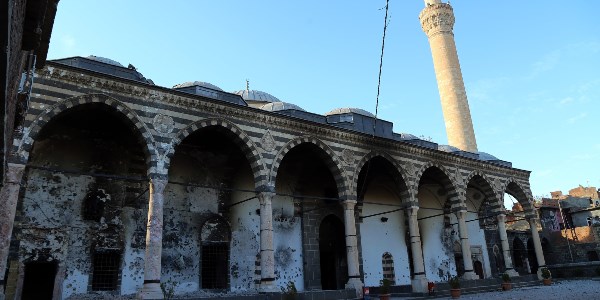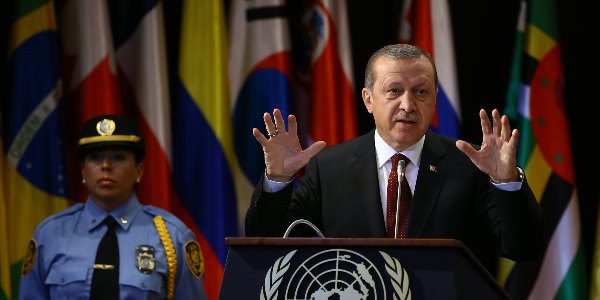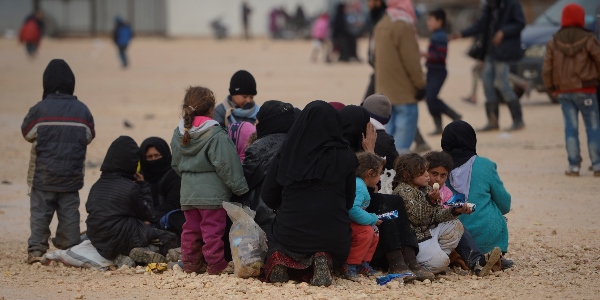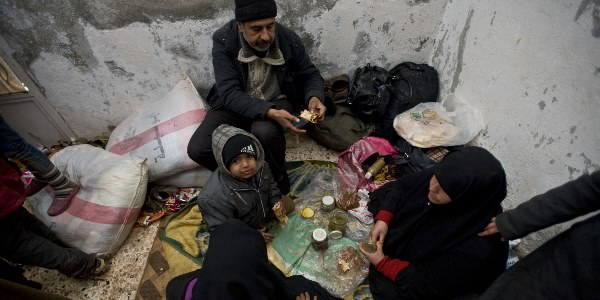Defense Minister Yılmaz says Ankara is not going to send its land forces into Syria, but will destroy any elements threatening Turkey’s security
Turkish Defense Minister Ismet Yılmaz said on Sunday that Turkey is not thinking about sending its ground forces into Syria.
Yılmaz’s remarks comes amid ongoing tension on the Turkey-Syria border as the Turkish military continued artillery fire on the Democratic Union Party (PYD) targets in Syria for a second day.
Turkey said it fired inside Syria according to the rules of engagement to retaliate against an attack on its border from PYD-held areas in Azaz town of northern Aleppo.
Following the military attack, some international media outlets wired reports that Turkey’s ground forces entered into Syria at the weekend.
“It is not true,” Defense Minister Yılmaz said during his speech to a Turkish parliamentary commission. He added that Turkey is not considering sending ground troops into Syria.
“There is no thought of Turkish soldiers entering Syria,” Yılmaz said, and added that Turkish military will do everything to protect its border security.
Turkey shells PYD in Syria for second day
The Turkish military shelled positions held by PYD terrorists in northern Syria for a second day on Sunday, killing two fighters, the Syrian Observatory for Human Rights monitoring group said.Turkey on Saturday demanded the pro-Assad terrorist group in Syria withdraw from areas that it had captured in the northern Aleppo region in recent days from insurgents in Syria, including the Menagh air base. The shelling has targeted those areas.Prime Minister Ahmet Davutoğlu said on Saturday the shelling had taken place under “the rules of engagement against forces that represented a threat in Azaz and the surrounding area”.Ankara views the group as an extension of the outlawed Kurdistan Workers Party (PKK) terrorist group, which has waged a three-decade-old insurgency in southeast Turkey and killed more than 40,000 civilians. The US, EU and Turkey listed PKK as a terrorist organization.Davutoğlu demanded that the Menagh base be evacuated and said he had spoken to U.S. Vice President Joe Biden to make that point and stress that the PYD was an extension of the PKK and a direct threat to Turkey.The shelling intensified at 2 a.m. (0000 GMT) before dying down but not stopping, said the Observatory, which reports on the war using a network of sources on the ground.The PYD backed by both US and Russia is working with President Bashar al-Assad, to control areas along Turkish border line.
Ankara sees PYD as a Syrian branch of outlawed Kurdistan Workers Party (PKK) terrorist group, which has been conducting terrorist activities in southeastern Turkey for more than three decades and killed at least 40,000 civilians.
YPG intends to show itself as a resistance group in northern part of Syria, which has been mired in a devastating civil war for more than five years, but Turkey said it has enough documents to prove that the group is launching ethnic cleansing in the area against Arabs, Turkmens, Sunnis and even Kurds who oppose their terrorist activities.
Ankara also said both PKK and YPG are led by the same leaders in Qandil, PKK headquarters in northern Iraq, as PYD sends weapons and militants into Turkey to PKK.
Davutoğlu confirms Turkish retaliation to shelling
Turkish Prime Minister Ahmet Davutoğlu on Saturday confirmed that Turkish troops shelled Kurdish positions in Syria in retaliation.Ahmet Davutoğlu said the army returned artillery fire after coming under attack from the terrorist PYD group based around Azaz in northern Syria. He stressed that the response was within Turkey’s rules of engagement.Earlier, a military source said the Akcabağlar base in Kilis province was shelled by “PYD/PKK” forces — referring to the Syrian Kurdish group and its affiliate PKK terrorist group, which has waged war on Turkey since 1984.Azaz in Aleppo province has been the scene of recent heavy fighting and the PYD’s armed wing, YPG, have advanced to Azaz — just six kilometers (four miles) from the Turkish border.Davutoğlu demanded the YPG withdraw from Azaz and the nearby Menagh military air base and warned the group against using either as a base to attack Turkey or Syrian opposition forces.”The YPG has blood on their hands,” he said.”It is a terrorist organization. It is a group that cooperates with and compliments Russia on the ground.”The premier said Ankara would respond to the YPG’s cross-border activities.”We will take every necessary step to ensure an environment that guarantees Turkey’s security, an environment without Daesh, the Syrian regime or the PYD,” he told a news conference in Erzincan, northeast Turkey.Davutoğlu said he informed U.S. Vice President Joe Biden about Turkey’s concerns via a telephone call, adding Biden had said he would pass on his remarks to the “relevant parties”.Biden visited Istanbul last month to discuss the Syrian crisis during which he also met Turkish President Recep Tayyip Erdoğan and Davutoğlu.During the press conference, Davutoğlu said the close cooperation between both countries is “necessary”.”During [Biden’s] visit, we agreed on some issues. These are not secrets on principle. Firstly, YPG should not cross the Euphrates River and should not do anything to bother Turkey.”Secondly, Russian offensive to Aleppo should not turn into something that would trigger immigration wave.”Third: A joint support of [Syrian] opposition’s offensive against Daesh on Marea-Jarabulus line. When Biden asked the latest developments, I told him that there has been no development regarding these three fundamental principles as we wish to see,” Davutoğlu said.Davutoğlu said YPG forces did not cross the river line; but they instead tried to invade Azaz by crossing into Afrin’s east, which has been under Kurds’ control.”YPG will remain within their lines during clashes,” Davutoğlu said.Davutoğlu also said Aleppo, Syria’s second biggest city, had been under siege since last week, when the humanitarian aid corridor between Turkey and the city was cut off by a Russian-backed government offensive.In a readout from the White House on Sunday on the phone call, U.S. Vice President Joe Biden urged restraint from Syrian Kurdish forces.Biden “noted U.S. efforts to discourage Syrian Kurdish forces from exploiting current circumstances to seize additional territory near the Turkish border, and urged Turkey to show reciprocal restraint by ceasing artillery strikes in the area” during the Saturday call, according to the White House.“The vice president expressed support for Turkey’s fight against PKK terrorism and the two leaders reaffirmed their shared goal of defeating ISIL [Daesh] and to work towards a cessation of hostilities, as agreed in Munich,” the White House said. ‘Forces using PYD’In an apparent reference to Russia, the Turkish prime minister said “forces using the PYD” had sought to cause a “massive refugee influx” towards Turkey.He added that Ankara was ready to take further measures to defend its borders.Referring to last Monday’s meeting with German Chancellor Angela Merkel, Davutoğlu said they had “agreed that the latest attacks on Aleppo targeted Turkey, and through Turkey, Europe”.Around 2.7 million Syrian refugees have crossed into Turkey since the civil war began and the latest offensive has seen tens of thousands more flock to the Turkish border.”Meetings between Russia and the U.S. continue,” Davutoğlu said.”And behold, after every meeting, the siege on Aleppo gets tighter and the number of refugees coming from Aleppo increases.” He added: “Somebody needs to draw a line against Russia and raise their voice.”In an admonition to the international community, Davutoğlu accused it of complicity in Russia’s attacks on civilians.”The international community that cannot say ‘stop’ to the ones who are air bombarding to displace hundreds of thousands of people have unfortunately become partners of the crime in Syria today,” he said.In Washington, U.S. State Department spokesman John Kirby urged Turkey to halt its cross-border artillery fire and called on the PYD and its “not to take advantage of a confused situation by seizing new territory”.He added: “”Turkey and the YPG share a serious threat of ISIL [Daesh] poised just to the east of the Azaz corridor. We continue to encourage all parties to focus on this common threat, which has not subsided, and to work towards a cessation of hostilities.”On Sunday, Turkey continued to shell PYD positions near Syria’s Azaz district according to Turkish security sources. The Turkish military said several PYD positions had been destroyed and 29 PYD terrorists were killed. PYD is the Syrian branch of the terror group PKK, which has targeted Turkish security forces and civilians since 1984.On Saturday, Davutoğlu demanded the PYD withdraw from Azaz and the nearby Menagh military airbase and warned the group against using either as a base to attack Turkey or Syrian opposition forces.The PYD seized the facility Thursday.Washington and Ankara disagree over the PYD, with the U.S. insisting that they are effective and reliable partners in the fight against Daesh.Biden visited Istanbul last month to discuss the Syrian crisis during which he also met Turkish President Recep Tayyip Erdoğan and Davutoğlu. Turkish troops hit YPG terrorist targets in Azaz town Turkish PM vows to hit PYD if it threatens Turkey’s security
Turkish leaders repeatedly warned YPG and its supporters not advance to west crossing the Euphrates River and vowed to hit any elements that intend to cross the “red line.”
For months the terrorist group stayed behind the “red line” declared by Ankara, but with the support of Russia, which supplies weapons and intelligence to the group, YPG crossed the line and advanced to the border town of Azaz, just a few kilometers away from Turkish territory.
Tensions have increased along the Turkish-Syrian border in the last few days; the Turkish army and the PYD terrorists continue to trade fire along the border.
A mortar fired from Syria hit a Turkish border post Sunday, Yilmaz said. According to the minister, the bombardment was carried out by PYD forces that hit a post in Kilis province to which the Turkish military responded with shelling.
According to Turkish media reports, the military fired at least 100 shells and killed over 40 PYD terrorist near Azaz town.
At least 37 PYD terrorists killed by Turkey’s artillery fire in Syria
Pro-Assad terrorist group, the Democratic Union Party (PYD) in the north Syrian city of Azaz has been under heavy bombing by Turkish military on Saturday. The Turkish attack came hours after Prime Minister Ahmet Davutoğlu announced that Turkey’s military will hit PYD targets in Syria if the terrorist group violates Turkish security. Military said it retaliated fire from the terrorist group across the border. “Today retaliation was taken under the rules of engagement against forces that represented a threat in Azaz and the surrounding area,” Prime Minister Davutoğlu confirmed. The Azaz-Jarablous line had been declared red line by Turkish authorities and Ankara repeatedly said that any elements violating this line will be hit. The area is vital for Turkey as it is planning to establish new camps for Syrian civilians in the area and aiming to declare a safe-zone. The PYD is a Syrian affiliate of the outlawed Kurdistan Workers’ Party (PKK) terrorist organization, which has been conducting a three-decade-long armed violation in southeastern Turkey. The PKK is recognized a terrorist organization by Turkey, the EU and U.S. Davutoğlu said both groups are terrorist organizations controlled from the same center, Qandil, the PKK’s headquarters in Northern Iraq. “The PYD is not representing Kurdish people in Syria, it kills everyone, including Arabs, Turkmens and even Kurds, who oppose their view,” Davutoğlu said.Davutoglu confirms Turkish retaliation to shelling He also demanded that PYD terrorists fully withdraw from the area, otherwise Turkey will continue to hit their targets. Turkey’s shelling hits Menagh Air Base, a former Syrian Air Force facility that is now controlled by PYD militants. According to Turkish military sources, at least 81 artillery fires conducted by the Turkish army targeted 19 PYD positions around Menagh Air Base. Turkish fires also targeted militant positons in Malikiya and the Kishtear area of Afrin city. At least 35 terrorist were killed and 15 others were injured in the attack. A second blow of Turkish artillery fire has been launched after midnight which killed at least two PYD terrorists, according to a Syrian monitor group.Turkey shells PYD in Syria for second day
Turkish Prime Minsiter Ahmet Davutoğlu said on Sunday that the Turkish military will continue attacking PYD targets near Azaz and the airbase until the terrorists leave the area.
“PYD must leave the area immediately,” he said adding that the terrorist group is trying to gain more ground by taking advantage of recent developments in the country. “It has blood on its hands,” he said.
Turkish officials denied claims that Turkey and Saudi Arabia are planning to send ground forces to Syria to fight against Daesh, saying that it only can be possible along with other partners of the US-led anti-Daesh international coalition.
Saudi fighter jets land in Turkey for anti-Daesh fight
Saudi Defense Ministry spokesman Ahmed Assiri has said on Saturday that Riyadh redeployed planes in Turkey’s İncirlik Air Base to intensify airstrikes on Daesh.Brigadier General Ahmed al-Assiri, adviser in the office of Saudi Arabia’s minister of defence, told pan-Arab Al Arabiya television that the kingdom was committed to stepping up the fighting against Islamic State and that the move was part of those efforts.He also said that the current presence in the air base was limited to aircraft and no ground troops had been sent.”What is present now is aircraft that are part of the Saudi Arabian forces,” Assiri said in response to a question on whether ground troops were included.Saudi Arabia has resumed its participation in air strikes against Daesh in recent weeks and U.S. Defense Secretary Ash Carter on Thursday welcomed its commitment to expand its role.Turkish Foreign Minister Mevlut Cavusoglu told the Yeni Safak newspaper on Saturday that Saudi Arabia had carried out inspections at the air base in preparation to sending aircraft.Saudi Arabia and Turkey both support rebels seeking to out Assad, and see his overthrow as essential for ending Syria’s five-year civil war that has cost more than 260,000 lives.
About claims that Saudi warplanes have arrived in Turkey, defense minister said: “At the moment they [aircraft] haven’t arrived, but they [Saudis] have come for exploration.”
“Four [Saudi] F-16s will come, the decision has been taken,” Yılmaz said
He clarified that the Saudi jets have not arrived “today, but they can come tomorrow.” He said that Turkey has allowed Saudi authorities to send their warplanes.
On Saturday, Saudi military spokesman Brigadier Ahmed al-Assiri told Al Arabiya television network that Saudi military jets have arrived in Turkey’s Incirlik air base in southern Adana province to carry out missions against Daesh. He said that the aircraft will be used in joint operations against Daesh in Syria.
While answering a question about the Turkish defense industries budget plan, minister Yılmaz said Turkish state-run defense firm ASELSAN is running a domestic missile project, Hisar-A, which will be ready to use in 2020.
He also informed that Turkey has boosted the National Intelligence Agency (MIT) budget to 379 million dollars.

